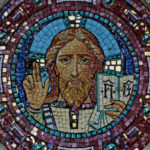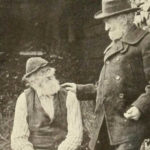We run our website the way we wished the whole internet worked: we provide high quality original content with no ads. We are funded solely by your direct support. Please consider supporting this project.

The Ultimate Criteria for Theology
Theology is thinking (logos) about God (theos). It is a good and necessary discipline, but only so long as it is centered on Christ. All of our speculation and debate about such things as God’s character, power, and glory must be done with our focus on Jesus Christ—more specifically, on the decisive act by which he reveals God and redeems humanity, his death on the cross.
The definitive thing to be said about God’s character is found here: God dies for sinners on a God-forsaken cross.
The definitive thing to be said about God’s power is found here: God allows himself to be crucified on a cross for sinners.
The definitive thing to be said about God’s glory is found here: God dies a horrifying, God-forsaken death upon the cross.
God’s character, power and glory are decisively revealed on the cross. Though it is “foolishness” to the natural mind, the cross is the power and wisdom of God to all who believe (1 Cor 1:18f). If we entertain concepts of God’s character, power, and glory that are inconsistent with what is revealed here, our thoughts are outside of Jesus Christ. Every thought about God, every mental picture we entertain about God, every single emotion that is “raised up against the knowledge of God” must be taken “captive to obey Christ” (2 Cor 10:5).
The true God revealed in Jesus Christ is not at all what the natural mind would expect—it is “foolishness”—for our natural expectations are influenced by our experiences in a fallen world that is permeated with the foundational lie of the serpent. We create a god of our own designs by magnifying our own fallen conceptions of character, power, and glory. Consequently, sometimes God’s character, power, and glory are presented in ways that don’t even resemble Jesus Christ, even within the Christian tradition. For instance, we often project onto the screen of heaven a cosmic Caesar, controlling the world through coercive power and intimidation rather than accepting God’s definition of himself in the crucified Jesus Christ. Such mental chimeras may inspire fear, but they do not transform us to become outrageous lovers.
The only hope we have of getting out of this fallen condition and walking in the ecstatic love of the triune God is to resolve that God’s revelation in Christ is true, however much it may contradict our fallen, worldly expectations. When the deceptive veil over our mind is removed and we see the glory of God shining in the face of Jesus Christ and when we fix our eyes on Jesus, we find a picture of God that could not possibly be more loving and beautiful. For here we find God going to the greatest extreme possible—suffering a God-forsaken, hellish death at the hands of the very creatures for whom he was dying! This is the greatest expression of love imaginable, and it alone reveals the truth about who the eternal, triune God is. God is this kind of love.
This is the ultimate criteria for all theology. Any other estimation of God will block not only our ability to think rightly about God, but also to love like God loves.
—Adapted from Repenting of Religion, pages 132-133
Image by brownpau via Flickr
Category: General
Tags: Cruciform Theology, God's Character, God's Love, Theology
Topics: Theological Method
Related Reading

How Revelation Uses Violent Images in an Anti-Violent Way
All the violent scenes in Revelation are symbols for the battle of truth and deception. They never involve literal violence. In fact, they symbolize ANTI-VIOLENCE. The ingenious way John helps us get free of deception of trust in violent power is by taking a standard violent symbol and juxtaposing it with a symbol that undermines…

God’s Shadow Activity [Sermon 7/15/12]
If we believe the whole Bible is inspired, how do we reconcile the Old Testament with the self-sacrificial, enemy-loving God revealed in Jesus Christ? In this past Sunday’s sermon at Woodland Hills Church, Greg succinctly summarizes his own thoughts by echoing that of the apostle Paul: the Old Testament is a shadow of the reality which is found in Christ.

Are You Fully Alive? Here’s the Key
Image by rashdada via flickr. The cross reveals the full truth about us. This truth reconnects us with our true source of life, which in turn heals our idol addictions. This dimension of the cross is frankly so breathtakingly beautiful that, so far as I can tell, very few followers of Jesus have ever really grasped it.…

Podcast: Can a Perfectly Loving God Be Angry?
Greg talks about the role of anger in this heated episode. http://traffic.libsyn.com/askgregboyd/Episode_0426.mp3

The Centrality of Christ in Hebrews, Part 1
The intense Christocentricity that the New Testament writers embrace is nowhere more clearly and consistently illustrated than in the book of Hebrews. Throughout this work we find a repeated emphasis on the many ways the revelation given to us in Christ surpasses that of the Old Testament. The author begins by stressing how the revelation…

Podcast: Where Does Forgiveness Fit in a Cruciform Theology?
Greg offers looks at forgiveness in a realm of natural consequences. http://traffic.libsyn.com/askgregboyd/Episode_0298.mp3
